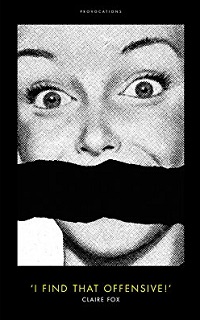A generation that accepts uncritically that ‘you can’t say that’ will slide from unwillingness to inability to disagree with or critique the propaganda it is relentlessly fed.
 Detail of the cover of Claire Fox's book.
Detail of the cover of Claire Fox's book.
‘I Find That Offensive!’
Claire Fox
Biteback Publishing
Does the progressive erosion of freedom of speech signal the twilight of Western civilisation? Becoming aware of my own reluctance to say certain things and hearing for the umpteenth time the mantra, “You can’t say that”, I started doing some reading on the subject.
We live in a cultural moment when many are waking up to the dangers of the loss of freedom of speech, with widespread discussion of university ‘safe-space’ policies, ‘deplatforming’ of ‘unacceptable’ speakers and ‘trigger warnings’ attached to potentially offensive material. Does this represent compassion for the more vulnerable and marginalised in society, or is it the privileging of the status of victimhood as the ultimate ‘trump card’ that shuts down further discussion? These are important questions.
Claire Fox describes herself as a libertarian who founded and directs the Institute of Ideas, an organisation whose aim is “to create a public space where ideas can be contested without constraint”. She was alarmed by two incidents in which high school audiences were deeply offended, hurt and threatened by ideas they disagreed with. As a result, she wrote the short book ‘I find that offensive!’.
Fox cites several examples in contemporary culture where freedom of speech (and hence opinion) is restricted by the subjective perception that someone is offended and is therefore a victim. With 90 per cent of universities and students’ unions now censoring speech, Fox worries that “the young are becoming too mollycoddled and infantilised for the rough and tumble of real life”. However, she does not blame them for this. Rather, she is critical of the previous generation who passed on a message of a world from whose dangers adult protection was required. This, she points out, does not respect the young, but treats them as “childlike, vulnerable and in need of adult protection”. It is “an insulting brand of paternalism”.
 I find that offensive, by Claire Fox.
I find that offensive, by Claire Fox.She further argues that the problem of restriction of free speech is “caused by the retreat from reason by the older generation” together with an educational philosophy more focused on self-expression than knowledge transmission. It seems to me that if there is no Truth outside of ourselves and no ultimate arbiter to which to appeal, then authority is located in the individual.
If ‘personal choices’ of opinions and beliefs define our identity, then any questioning of beliefs that undergird that identity becomes an attack on the person and is perceived as hurtful or even hateful. So-called ‘generation snowflake’ represents the inevitable result of the rejection of external epistemic authority.
It is hard to resist the force of Fox’s provocative critique. Though she appeals to ‘Enlightenment Ideals’, I hope that most Christians reading her book will realise that confidence there is such a thing as Truth and that God has definitively spoken in Jesus, is the real foundation for a security that would allow a ‘safe’ public space for a ‘diversity’ of opinion. Bad arguments must be shown to be bad arguments, not simply dismissed ad hominem. The alternative involves policing ‘safe space’ by increasingly powerful state authorities who decide what can and cannot be said. And we ought to be concerned about that.
Seventy years ago, Dorothy Sayers commented that if we teach people to read but not to think critically (which, of course, requires debate and discussion of alternate views), then they would be “slaves to words in their emotions instead of masters of them in their intellects”.
A generation that accepts uncritically that “you can’t say that” will slide from unwillingness to inability to disagree with or critique the propaganda it is relentlessly fed through news and entertainment media. It will be endlessly manipulable by those who have the loudest voices, the best funded PR campaigns and who flatter them to think that in shutting down rational debate, they are showing compassion to all their fellow victims. That is not compassion; it is cultural suicide.
Mark Stirling. This article was published with permission of Solas magazine.

Las opiniones vertidas por nuestros colaboradores se realizan a nivel personal, pudiendo coincidir o no con la postura de la dirección de Protestante Digital.
Si quieres comentar o